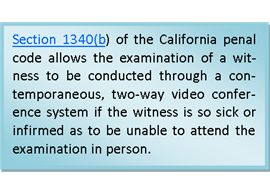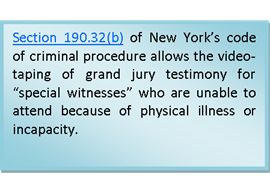The Role of the Courts
Although people age at different rates and in different ways, adults over the age of 65 may have some level of physical or mental impairment (see Demographics of the Aging Population). For example, a 2009 study of cognitive functioning in people age 70-79 over eight years found that 30 percent maintained cognitive functioning, but 53 percent experienced some loss of function and 16 percent had major cognitive decline. Physical and mental impairments can impact an older person's ability to take part fully in court proceedings.
Accommodations in the Courtroom and Judicial Process
Courts can help ensure full access and participation by older persons with a physical or mental limitation by making accommodations to the courtroom setting, the handling of court hearings, and case and calendar management. The American Bar Association "Recommended Guidelines for State Courts Handling Cases Involving Elder Abuse" recommend that courts "provide accommodations for persons with physical and mental deficiencies and, if necessary, hold hearings in cases involving elder abuse in the setting that best accommodates the needs of the abused older person." The Eleazer Courtroom at Stetson University is a state-of-art facility that demonstrates how courtrooms can be modified to afford older people an appropriate legal forum.
The following examples of accommodations for older persons with physical or mental impairments have been implemented or recommended by judges, court managers and other professionals working to improve their courts' responses to elder abuse:

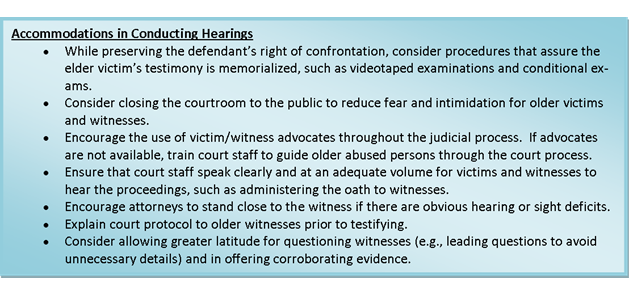
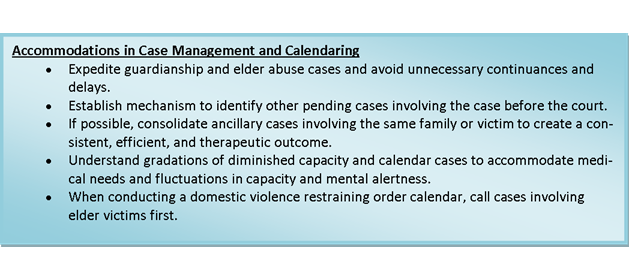
Courthouse Facilities and Role of Technology
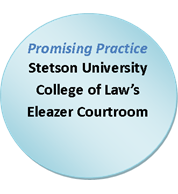 Physical access to courthouses and the justice process are real concerns for older persons. Although each individual ages at a different rate, in 2005, 42% of adults over 65 reported some form of functional limitation. Common signs of advanced aging include dimming eyesight, failing hearing, loss of memory, decreased comprehension rate, and physical impairment. These impairments can decrease elderly persons' abilities to perform daily tasks, decrease mobility, and can affect elders' communication with others.
Physical access to courthouses and the justice process are real concerns for older persons. Although each individual ages at a different rate, in 2005, 42% of adults over 65 reported some form of functional limitation. Common signs of advanced aging include dimming eyesight, failing hearing, loss of memory, decreased comprehension rate, and physical impairment. These impairments can decrease elderly persons' abilities to perform daily tasks, decrease mobility, and can affect elders' communication with others.
Promising Practices and Programs
Promising practices combine physical accommodations and technology, with the goal of ensuring physical access to the courthouse or participation via technology.
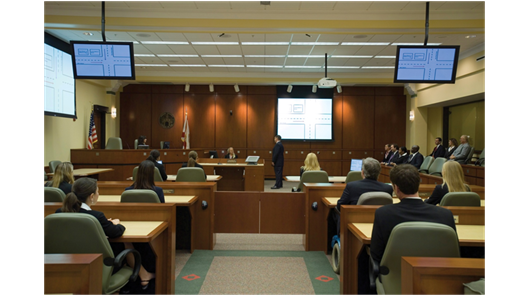
 Videotaped testimony is generally used when a witness is found to be either physically or emotionally unable to testify in person. Older individuals, due to severe illness, physical impairment, and other disabilities associated with aging, are unable to be present at court proceedings. These circumstances make the use of videotaped testimony beneficial in elder cases.
Videotaped testimony is generally used when a witness is found to be either physically or emotionally unable to testify in person. Older individuals, due to severe illness, physical impairment, and other disabilities associated with aging, are unable to be present at court proceedings. These circumstances make the use of videotaped testimony beneficial in elder cases.
Criminal code provisions in California and New York provide models for other states considering the use of video testimony in cases involving older litigants, victims, and witnesses. The California law authorizes the conditional examination of a witness in a criminal case who may be unavailable at trial. The New York statute bill acknowledges that elderly victims are often "unable to pursue restitution from the perpetrators" as a result of "advanced age and the length of court proceedings."
Language Services
Limited English proficiency can be another impediment to access to justice for older adults. Full and meaningful participation in court proceedings can be difficult for any person with limited English proficiency, and these difficulties are exacerbated for older adults who also may be experiencing declining physical or mental capabilities. Courts should be aware of the potential need for language services for older persons, including court interpretation, document translation, and availability of written materials in languages other than English. Numerous resources are available to assist courts in assessing the need for language services and for providing access to those services. See the Language Access Resource Guide, available from the National Center for State Courts, for a compilation of resources. Among these resources is a benchcard that provides information related to the appointment and qualification of court interpreters in domestic violence protection order cases.


